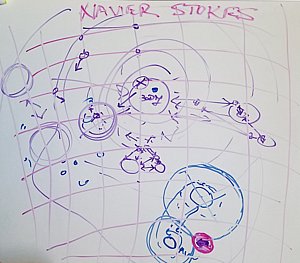I’m always amused at conversations that lead into how a specific demographic has a special or implied, exclusive understanding about a specific communications technique. Just because someone knows how to upload a video to YouTube, this does not make them a Social Media expert (nor does it make someone an eCommerce expert because they sell doilies on Etsy).
For some people, today’s youth who knows how to upload a video to the Internet is akin to yesterday’s youth who used to help set the VCR. In each ones time they were both considered tech geniuses regardless of their actual skills.

As the adage goes: “Any sufficiently advanced technology is indistinguishable from magic.”
This applies to perceptions of any skills competency. Just because a person has an understanding of something you don’t understand, that does not make them an expert in a subject matter (and them being an expert in one aspect of a technology doesn’t immediately make them an expert in all aspects).
Bringing this back to the topic of communications. New doesn’t always involve doing something different. While the tools may change, the fundamentals have always remained the same.
Believe it or not, social media is just one of many tools available to achieve your goals and those old tools? Well, in some cases, they are still just as viable for communications as the new tools. Old is new. New is old. Rinse, repeat.
Comments Off on New is the new old
So now that I’ve introduced you to thinking about Brand You or as we’ve been calling it, your persona, let’s think about what I’ve said and consider how this applies to a businesses.
Haven’t you noticed? Companies have personalities. Companies go to great lengths through advertising and marketing to establish a brand identity (persona) knowing that more often than not you’re going to buy something from either someone you identify with, someone you know or someone you trust. When companies inundate you with messaging they are trying to establish this relationship on a pseudo subconscious level so that you’ll gravitate to their product when presented with a comparable set of options.
Here is an easy thought exercise for you the next time the TV is on. Actually watch the commercials. Based on time of day, day of week and commercial content you can almost always identify who that company thinks is watching the show that you are watching. In theory the persona they are attempting to identify with is supposed to ultimately be you. So that either you or someone you influence will buy the item (eg, kids and toys).
Now a more challenging one. Go to your cupboard or refrigerator and look at what you have in there. Ask your self “why did I first buy this <fill in the blank>?”. Inevitably for alot of people there will be something that falls under the “that’s what my mom bought me as a kid and it’s my favorite” category. Think about that…
Companies have two ways to bring you in as a customer. Positive referral from someone you have an relationship with or by creating a relationship via marketing so that, as I said above, when confronted between product A or B you go with what you know. All they have to do is get you to buy once and if you have a satisfying experience on your first try you may never try the other products. That’s one battle down in the war for your brand loyalty.
One extension of building brand loyalty is through lifestyle associations. Take for example the soft drink/soda business: Mountain Dew = extreme sports, Sprite = hip hop, Pepsi = young and young at heart, Coca-Cola = happy people, or Fresca = dieters. Companies play this card as one more relationship angle based on your personal identity with the hope that if you want to identify with your crowd you’ll buy their product. Sprite used this masterfully several years ago when they went after the Urban/Hip-Hop crowd or Mountain Dew with the extreme sports crowd.
Now maybe you can understand why companies go to great lengths to protect and promote their identity/persona/brand image. Or why when a company’s image is so badly damaged they change their name and logo and try to reinvent themselves. Good or bad, sometimes it works.
Worldcom -> MCI -> Verizon
THQ -> Atari
Enron -> CrossCountry
Philip Morris -> Altria
Comments Off on Persona = Brand

 Bryan Needs a Title for His Home Page
Bryan Needs a Title for His Home Page